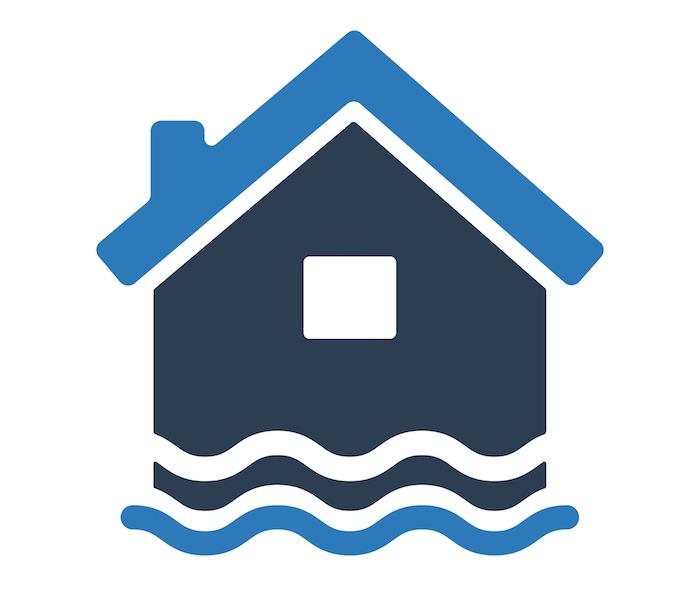How Does A Professional Determine the Products to Use When Cleaning Flooded Houses?
10/20/2020 (Permalink)
 After your home suffers flood damage, you need a team of professionals to assist you with cleanup. Call SERVPRO right away! We are always available.
After your home suffers flood damage, you need a team of professionals to assist you with cleanup. Call SERVPRO right away! We are always available.
The Chemical Composition and Types of Materials Affected by Flood Damage in Bristol Homes are the Main Guidelines SERVPRO Considers.
A flooded home in Bristol, requires various resources to restore the areas damaged by the intruding water to their preloss state. The use of chemical agents is one crucial process because it helps remove soiling, contaminants, and other unwanted materials. You might experience difficulty choosing the right cleaning products that do what you intend to achieve because of the variety of such products in the market. When SERVPRO cleans Bristol properties after flooding, the choice of cleaning product is based on the prevailing conditions and the effectiveness of the product.
Which factors determine the effectiveness of a cleaning agent against soiling from flooding?
- Cleaning strength
- Disinfectant properties
- Deodorizing properties
- Safety when used with other products
Flooding leads to various levels of soiling in many parts of the structure, including the floors and walls. It is common to find water lines on vertical surfaces separating the parts of a cat by floodwaters from the unaffected ones with a layer of soiling. The cleaning product used should be strong enough to strip away these soils from the affected materials.
Since floodwaters are a cocktail of organic and inorganic soils, our SERVPRO technicians consider cleaning products that can work against a broad spectrum of substances. Another indicator of product strength is whether its effectiveness changes during the cleaning process. In this case, strong products refer to those that work even when conditions such as pH change rather than working within a narrow pH range. The products should not be too strong to cause physical damage to the materials they are meant to clean.
How does flooding soil properties?
- Causing bleeding of fabric dyes
- Dislodging finishes from structural materials
- Leaving residues such as mud and silt
Floodwater can soil your property by depositing materials collected outside the structure, such as mud or silt. Soiling can also originate within the structure when some materials deteriorate after exposure to water. For instance, fabrics such as upholstery, draperies, carpets, and even clothes can shed dyes when exposed to water over extended periods. Such dyes spread to other areas causing stains and other kinds of soiling. Other forms of deterioration, such as drywall crumbling or glues in composite materials liquefying, create soils that need removal from the property.
How strong should the ingredients in cleaning agents be?
Floodwaters contain all sorts of dangerous substances, including:
- Disease pathogens such as bacteria and viruses
- Harmful chemicals such as herbicides
- Biohazards such as raw sewage
Removing all traces of the harmful substances requires vigorous action. The correct cleaning products that can kill, neutralize, or remove the harmful substances make it easier to restore the property to its usual sanitary conditions. It also simplifies the specific decontamination processes that you might need to carry out at the property. Our SERVPRO technicians use different categories of products with decontamination capabilities like:
- Phenolics which work against bacteria, fungi, and blood-borne pathogens
- Quaternary compounds that help against fungi and bacteria
- Bleaches for germicidal action against viruses and bacteria
Do cleaning agents help control odors?
Odor management is a significant part of the equation when making plans to clean a flooded property. The floodwater might smell bad since it contains various kinds of wastes. Odor can also develop when water sits in a property over an extended period because of microbial growth or other chemical changes. Some cleaning products also emit strong smells, which might make people uncomfortable. Therefore, when planning the cleanup exercise, you must find products that can counter the awful odors caused by flooding while ensuring that the products do not introduce other strong smells.
Our SERVPRO technicians combine various approaches to address the issue of odor. In most cases, we use specially formulated cleaning products created without using ammonia, solvents, or fragrances. The ingredients used to formulate the products meet or exceed the EPA and Green Seal design for the environmental guidelines. The products are also rapidly biodegradable and free of VOCs, so they do not leave strong odors in the areas we clean.
Since cleaning products are not meant to work as fully-fledged deodorizers, we might add water-based deodorizers into the cleaning solutions to neutralize malodors and leave a sweet scent in the areas we clean. Incorporating deodorization in the cleaning process simplifies the finishing processes that your property needs to regain its preloss state.
Cleaning products play a crucial role in the restoration of flood-damaged materials. SERVPRO of Bristol uses the best products for a positive outcome. Call us at (860) 582-3330 to help clean up any soiling from your house, "Like it never even happened."

 24/7 Emergency Service
24/7 Emergency Service